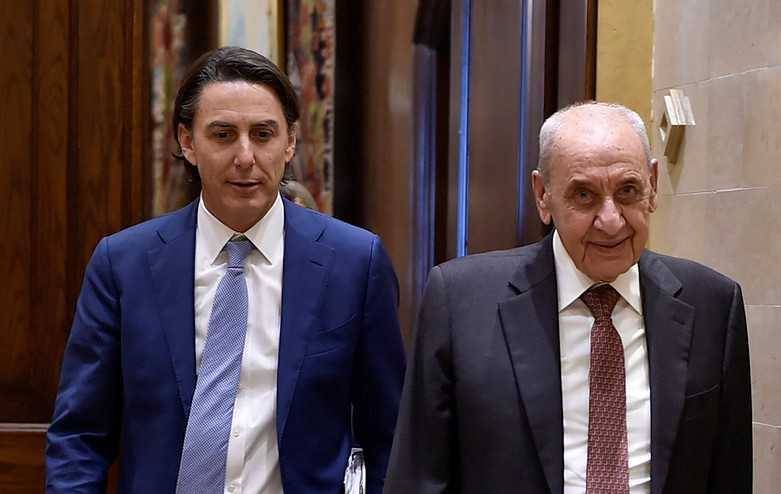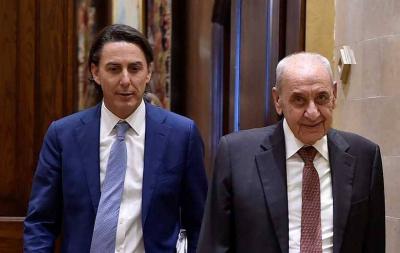In her meetings, U.S. Ambassador Lisa Johnson refuses to link the presidency to the Gaza war; however, the American path in negotiations regarding the southern front indicates otherwise. High-level political sources accompanying U.S. envoy Amos Hochstein confirm that the presidency and the Gaza war are parallel lines; however, they will inevitably converge. Although there is no clear announcement, the connection has become a reality, and the presidency has become part of the solution and a guarantee for the stability that is being worked upon, as reported by "Nidaa Al-Watan." Until the anticipated solution of ending the war on Gaza matures, the National Moderation Bloc's initiative aims to pave its way toward a presidential dialogue hoping to lead to the election of a president.
This movement received acceptance from some powers while others remain hesitant. The bloc's actions broke the presidential stalemate and followed a meeting of the ambassadors of the Quintet at the Pine Palace, which yielded no new results. In the background, some speak of harmony between the Quintet and the bloc’s MPs. The ambassadors view the bloc’s initiative positively in terms of the effort to hold a dialogue table followed by an election session. They also assess that the visits by the bloc’s MPs have revitalized the political dynamics. However, at the internal level, their movement remains questioned, with many uncertainties still unanswered.
One of the positives is that it may provide an outlet for opponents of dialogue to climb down from their rejection stance; however, there is skepticism regarding the desired outcomes. How can those who rejected invitations to dialogue facilitate the bloc's efforts? Who is calling for the dialogue? Who will preside over its session? Which parties will be included in the invitation? What if independent MPs refuse to be represented by other MPs and insist on attending directly? Is it true that the bloc intends to have the eldest MP chair the dialogue session? What if the eldest is from the Socialist Party or the Forces? Will the dialogue take place in a public hall? Who grants permission for the participants to speak and organizes their discussion? What will they discuss? What guarantees the transfer of dialogue outcomes to the electoral session? What if they fail in the dialogue? Will they request President Nabih Berri to open the doors for electing a president without consensus? Will President Berri accept sitting at a dialogue table with those who rejected dialogue with him? Can dialogue be held while excluding the Shiite duo?
The initiative does not involve a traditional dialogue table presided over by a person nor does it impose a prior agreement on a single presidential candidate. Instead, it proposes holding a consultative parliamentary session for one day rather than seven, with all participating deputies pledging not to boycott the electoral sessions until a candidate is elected with the presence of two-thirds of the Parliament and a vote by 65 deputies. In practice, the initiative opens the door for voting based on a numerical majority rather than consensus, according to "Nidaa Al-Watan." Will the duo agree to attend an open session before pre-approving a presidential candidate's name? The answer is of course a refusal, as both Hezbollah and Berri want consensus on a president and will not accept electing a president outside this equation.
The details remain unclear; each person meeting with the bloc's MPs approaches their initiative differently. However, their step is being followed by the Quintet, which is encouraging them to continue their efforts, as the committee now requires a dialogue committee to bridge the viewpoints among its ambassadors. If all MPs agree on the National Moderation Bloc's proposal, it would compel the duo to agree to attend to avoid being accused of obstruction. Nevertheless, Hezbollah and Berri are convinced that any effort will not succeed in light of the tense situation on the ground in the south. According to facts and data, internal movements, whether from the bloc or the Quintet, are in one place, while the decision lies elsewhere.
Those familiar with Hochstein's initiative have noted a connection between the paths of war and the presidency. Hochstein has frozen his efforts until after reaching an agreement on the ceasefire in Gaza because he was unable to secure clear commitments from the Israeli side to stop the war. He awaits the crystallization of the equation established by Hezbollah, continuing its war based on it, which is to stop the war to begin consultations about Lebanon. His ideas are no longer limited to halting the conflict on the southern front. He is working on providing the conditions for political stability that would help entrench the equation he is working on to permanently stop the southern front conflict and the return of settlers from the north. Hochstein believes that security stability must precede political stability, which can only be solidified by electing a president and forming a new government. Any movement outside of this equation is merely attempts that cannot be relied upon for results.




